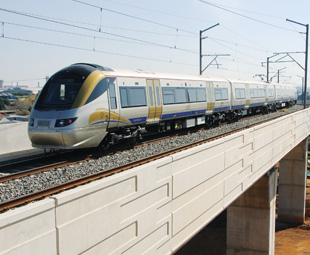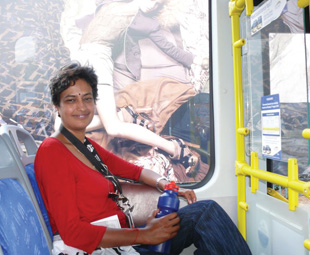A thumbs up for the Gautrain and bus

The decision to switch from using her car to commute to work and back to using the Gautrain system instead has come easily to Sharmla Moodley. A FOCUS case study by UDO RYPSTRA.
Sharmla Moodley is a vivacious resident of Benoni on the East Rand, who works for M-Net’s programme finance department at the broadcaster’s headquarters in Ferndale, Randburg. In fact, she will score handsomely in financial terms if she sticks to using the train when the freeways she used to travel on get tolled. However, new toll fees proposed for the Gauteng freeways are currently being probed by a government task team following a huge public outcry.
For 22 years she has been travelling the 64 km route in both directions by car, getting onto the freeway at Snake Road on the East Rand, and taking the offramp at William Nicol Drive near Sandton in the morning, and vice versa in the evening. That’s 128 km a day, or 640 km per week or 2 560 km per month, on average. To fill the 45-litre tank it would now cost about R450 a week or R1 800 per month in petrol alone.
“I leave home at 5.30 am and it would take me two hours with the terrible traffic increase and road works; I might arrive at work by 7.15 am. In the afternoon I leave at 4.00 pm, and would arrive at home by 6.00 pm.
“My car used to go in for a service every 15 000 km, which used to be one minor service and one major service per year, the service was heavy and so was the tyres’ wear and tear.”
 With the advent of the Gautrain in June last year, she did some calculations and decided to try out the train and feeder bus, and park her car at Rhodesfield station.
With the advent of the Gautrain in June last year, she did some calculations and decided to try out the train and feeder bus, and park her car at Rhodesfield station.
“I (still) leave home at 5.30 am, and it takes me ten minutes to get to the station as Rhodesfield is 15 km away from my home. I catch the 5.56 am train from Rhodesfield which arrives at Sandton by 6.16 am. From there I take the 6.26 am bus from Sandton and it drops me off at the corner of Republic Road and Oak Street, Randburg. I just have to cross a road to be at M-Net at 6.40 am.
“So in about one hour I commute to and from work, and with the one hour saved in the morning and afternoon, it puts two hours back into my day without traffic frustration and road rage, the robots not working or traffic jams – I don’t experience this any longer – and, of course, no traffic fines that I normally caught on William Nicol Drive.”
Moodley says it costs her R9,00 per day for parking her car at Rhodesfield, R21,50 for a single train ride and R6,00 for a single bus ride. Multiplied by two, daily travel and parking costs her R64,00, or R320,00 per week, or R1 280,00 per month.
She now fills the tank up only twice a month, which means an extra R900,00 a month which brings her total monthly cost to R2 180,00, which includes using the car on weekends for non-work related, personal travel.
“Monetary value is about the same as when using your car, but the advantages far outweigh using your car,” she says, listing all benefits as:
• Putting back two hours into your day
• Less mileage on your car
• Less wear and tear on the tyres
• Service intervals on the car are less frequent for the 15 000 km interval service
• No frustration of road rage and traffic jams
• No fear when driving when it rains
• No traffic fines
• Not being exhausted from the travelling anymore.
She also uses the steps instead of the elevators when climbing to the top bus station from Sandton and Rhodesfield, “so I get my daily exercise”.
Moodley emphasises, “The train is fast, efficient, and so is the bus service, so it’s quick commuting, you don’t wait for the bus or train, if you’ve missed the train, another train is there within 8 minutes, which is so fast. I know the bus and train times, so I don’t wait for either, as I make it for the 4.14 pm train in the afternoon and the 3.50 pm bus from M-Net.
“I started using the Gautrain in June 2010, as the route from Rhodesfield to Sandton was opened due to it being the same route from OR Tambo International, which was opened for the soccer 2010 visitors, and since I was on the route I did score. During the world cup season the buses were travelling more often, now they have reverted back to the regular scheduled times.”
In the final analysis, Moodley says if she would have to pay toll fees of say, 60 cents per kilometre for the freeway option, this would add R76,80 per day, R384,00 per week and R1 536,00 a month. Now add the R1 800 it would cost her in petrol, the wear and tear, maintenance services, etc. A not so cool R3 336,00!
Enough said?
Published by
Focus on Transport
focusmagsa




